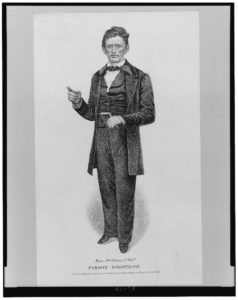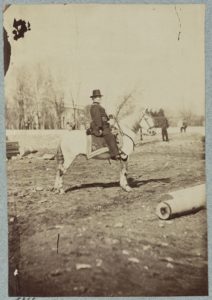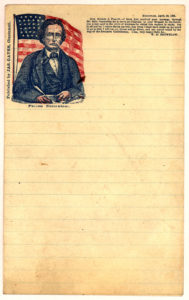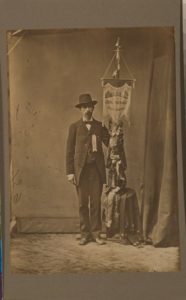150 years ago today black men voted for the first time in Tennessee. Ex-Confederates were still prohibited from voting. Republican Governor William G. Brownlow (Parson Brownlow) was re-elected by a large majority.
From The New-York Times August 2, 1867:
THE TENNESSEE ELECTION.
___________________
Whites and Negroes Voting Together.
___________________
No Disturbance at the Polls Reported.
___________________
Gov. Brownlow Undoubtedly Elected by a Large Majority.
___________________
Special Dispatch to the New-York Times.
KNOXVILLE, Tenn., Thursday, Aug. 1.
The election to-day was one of the most orderly ever known. The liquor-shops were all closed, and the special police force and the militia prevented all trouble. Black policemen were detailed by the Leagues and accepted by the authorities. A disturbance to-night between a black and white man brought out eighty armed blacks in an instant. … [Brownlow the big winner]
To the Associated Press.
MEMPHIS, Thursday, Aug. 1.
The election passed off quietly in this city, and not a single disturbance occurred. The saloons were all closed, and the best of order prevailed. The Twenty-Fifth Infantry were stationed at Court-square during the day, but they were not called out.
By the first arrangement the whites and negroes were to have separate voting places; but later in the day, finding that they could not all vote there, they sought other polls in crowds, and then were unable to all vote owing to the short time allowed. …
NASHVILLE, Tenn., Thursday, Aug. 1.
The election to-day was the quietest ever known here. The whites and blacks voted without interruption, and not a hurrah for either party was given. At the polls a few parties were arrested for attempting to vote twice, and others for carrying concealed weapons. … [Brownlow rolls]
The next day the Times published an editorial about the election. It was good that the vote was peaceful, but the result was underwhelming since the odds were stacked so much in the parson’s favor. The editorial was concerned that an “extreme proscriptive policy” could cause trouble throughout the South:
The Tennessee Election.
The triumph of the Brownlow faction proves only the success with which it has manipulated the registration of voters. As an indication of State feeling or policy it amounts to nothing. When a man in office possesses the power of disfranchising his opponents, his election or reëlection can be considered only a sign of thorough, unscrupulous work – not of moral strength or personal or political popularity. And when he outrages propriety by appointing candidates as registrars, and so enabling them to adapt the lists to their own convenience, the fact of their election follows as regularly as night follows day. In deed the Tennessee election was, on the whole a meaningless formality. With four-fifths of the whites disfranchised, and with the registration altogether in the hands of BROWNLOW and his men, what signifies the vote of Thursday last?
For similar reasons, what importance attaches to the absence of the riot and bloodshed which were widely feared? That the election passed off quietly, is a good ground of rejoicing. But the cause of the quiet ought not be overlooked. It was not BROWNLOW of his volunteers who preserved order, nor the superior strength of the victors, nor the peaceful disposition of the people. To United States troops belongs the praise. Gen. THOMAS, acting under instructions from Gen. GRANT, was the great peace-maker of the day. His arrangements restrained the ill-blood which exists on both sides, and rendered orderly what would otherwise have been scenes of violence and strife. The circumstance is not particularly gratifying. It is not pleasant to reflect that Federal bayonets are indispensable auxiliaries of an election in a State supposed to be reconstructed. But so it is, and we may as well recognize it frankly.
The condition of Tennessee is, then, to-day, as it was a week ago – volcanic; so evidently explosive that it must continue a source of most painful anxiety. On one side, BROWNLOW, with all the insolence of power, and with the State organization in his hands; on the other, the rebel Democratic element, angry, aggressive, kept down only by soldiers. Between these parties the greater number of white Unionists of the State are crushed, as between the upper and nether millstone. The sole hope of deliverance for this class – the sole hope of peace and prosperity for the State – lies in the adoption of more moderate counsel than can be anticipated while BROWNLOW fills the Executive chair. It is the remoteness of this prospect that renders the aspect of Tennessee deplorable, and that suggests the danger of an extreme proscriptive policy in reorganizing other portions of the South.According to Google Books “Governor Brownlow was well aware that his dual policies of white proscription [disfranchising ex-Confederates] and black empowerment [enfranchising black men] had ushered in a political-racial revolution. Such drastic measures required vigilant law enforcement.” This included appointing all the voting registrars and giving them “complete control over the electoral process.” In February 1867 the Tennessee State Guard was mobilized. This force included blacks and during the gubernatorial election “protected the registration of black voters, ensured a relatively safe political canvass, and policed the precincts both to thwart Rebel interference and to prevent the disfranchised from voting.”[1]
The following summary is taken from Wikipedia’s entry for William Gannaway “Parson” Brownlow:
The Radicals nominated Brownlow for a second term for governor in February 1867. His opponent was Emerson Etheridge, a frequent critic of the Brownlow administration. That same month, the legislature passed a bill giving the state’s black residents the right to vote, and Union Leagues were organized to help freed slaves in this process. Members of these leagues frequently clashed with disfranchised ex-Confederates, including members of the burgeoning Ku Klux Klan, and Brownlow organized a state guard, led by General Joseph Alexander Cooper, to protect voters (and harass the opposition). With the state’s ex-Confederates disfranchised, Brownlow easily defeated Etheridge, 74,848 to 22,548.
The Shiloh National Military Park also has a good summary of the election at something called Facebook
[August 3, 2017:] According to the Freedmen’s Bureau several “colored laborers [were] discharged from employment in Davidson County, Tenn on account of voting for certain candidates in the election of August 1st 1867”. In all cases the cause of the termination was “Voting the radical ticket.” Apparently ballots weren’t that secret; apparently the Bureau worked to compensate the laborers by charging the employers.
From the Library of Congress: Parson Brownlow; General Thomas; 1826 map (Chattanooga still labeled Ross’s); message to Pillow; remains of a war flag.
Parson Brownlow’s response to General Pillow’s request was apparently reported in the parson’s own newspaper.
- [1]Dollar Kent, Larry Whiteaker, W. Calvin Dickinson, editors Sister States, Enemy States: The Civil War in Kentucky and Tennessee. Lexington, Kentucky: University Press of Kentucky, 2011. Print. page :?.↩



![Tennessee. ([S.l.], 1826.; LOC: https://www.loc.gov/item/2003627038/)](https://www.bluegrayreview.com/wp-content/uploads/2017/07/tn-300x188.jpg)

